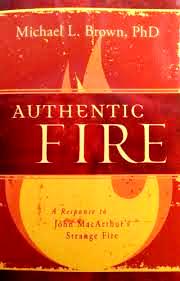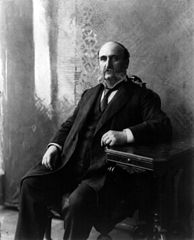Michael Brown’s Authentic Fire, reviewed by John King
 Michael L. Brown, Authentic Fire: A Response to John MacArthur’s Strange Fire (Excel Publishers, Dec 12, 2013), 418 pages.
Michael L. Brown, Authentic Fire: A Response to John MacArthur’s Strange Fire (Excel Publishers, Dec 12, 2013), 418 pages.
Dr. Michael Brown in his work Authentic Fire confronts the misinformation of Pastor John MacArthur’s outspoken zeal against all things charismatic in his book, Strange Fire. While Dr. Brown admits that on some points Dr. MacArthur is right on, his language is radically abusive in tone. And some of Pastor MacArthur’s comments are simply untrue. Brown carefully separates the message from the messenger in addressing charismatic abuse before proceeding to the good stuff: how to burn with authentic fire.
How successful Pentecostal movements have been at policing their own—or if they have just been policing their ammunition, cleaning up their own crime scene to mitigate the charges—is debated early. This is a must read section for persons like myself who miss the mourners bench and the witness from the unlearned that God is among us (1 Corinthians 14:16). Charismatic abuses are undeniable: the prosperity doctrine; slain in the ‘spirit’ but not healed; emotionalism without holiness; game-show hype and seeker-centric services instead of the message of the Cross; the superficial replacing the spiritual. Brown recognized that we are catering our gospel to carnality.
But as Brown shows, there is a true spirit of co-operation with God’s Spirit among a large segment of Pentecostal leadership to penitently admit the self-centric extremes visible in their midst and to confront it with biblical truth. Brown has been outspoken in past writings about what he called the “gospel” of self. Simply put: MacArthur has nothing constructive to add to the honest voices within Pentecost that call for repentance. MacArthur’s Strange Fire, which required a response in the writing of Authentic Fire, provides mere background static that drives Pentecostals to go on the defense—something Brown cautions against and wants to prevent from happening.

Ira D. Sankey (1840-1908) was an American gospel singer and hymn writer best known for his association with evangelist D. L. Moody.
Brown says that some of MacArthur’s ranting is a false attack akin to what England’s ministerium did in 1874 when they labeled the powerful outcomes of Ira Sankey’s singing as human conceit and not worship. But emotion is not emotionalism. A move of God’s Spirit often elicits a heartfelt response which is smothered in the name of propriety or order by well-meaning but misguided church leadership—who are afraid to express the full depth of their Christian experience [Luke 6:23; 10:20;19:37]. If there was abuse, it was in requiring a charismatic outburst—and not simply allowing a passionate response to happen.
MacArthur is a cessationist maintaining that tongues and prophecy have ceased based on his interpretation of 1 Corinthians 13:8. MacArthur called a Pentecostal revival service “craziness” and an “emotional orgy.” No wonder Brown had to respond in a gentle spirit while encouraging charismatic believers who only want a closer reality of their Savior and to be under His administration. In Brown’s words: “I embraced it with tears of joy while others mocked it. And that’s the great concern I have today.”
Brown speaks of MacArthur’s judgment of a move of the Holy Spirit as a faulty exegesis of Scripture and a flawed pneumatology. Brown provides scriptural insight to support this assertion. It is also noteworthy that MacArthur has been looking at a small percentage of American ministries that are not at all representative of the global move of God’s Spirit.
Category: Spirit, Spring 2014


